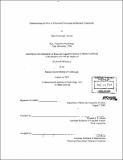Understanding the role of referential processing in sentence complexity
Author(s)
Warren, Tessa Cartwright, 1974-
DownloadFull printable version (11.57Mb)
Other Contributors
Massachusetts Institute of Technology. Dept. of Brain and Cognitive Sciences.
Advisor
Edward A.F. Gibson.
Terms of use
Metadata
Show full item recordAbstract
Language comprehension requires syntactic, semantic and pragmatic processing. The work presented in this thesis clarifies the role that the resource demands of syntactic and referential processing play in sentence complexity. Results are interpreted within the framework of the Dependency Locality Theory (Gibson, 1998), which provides a hypothesis about how computational resources constrain the process of sentence comprehension. These new results support and further develop the DLT's discourse-based distance metric for computing locality. The experiments presented here were designed to investigate the referential processing load imposed by relating noun phrase (NP) anaphors to their antecedents and to discover the ramifications of increased referential processing load on behavioral measures of language comprehension. Four questionnaire experiments tested the intuitive complexity of doubly nested sentences containing NPs that were differently referentially accessible. These experiments demonstrated that sentences with structural dependencies crossing less accessible referents are judged more difficult than sentences with structural dependencies crossing more accessible referents. They also showed that referential accessibility manipulations had a negligible effect on intuitive complexity in positions that did not interrupt long distance structural dependencies. (cont.) Five self-paced word-by-word reading experiments elucidated the time course of the complexity ramifications of increased referential processing. Each of these experiments showed that when less accessible referents interrupted long distance structural dependencies, reading times slowed more at the completion of the structural dependency than at the referent itself. From the results of these experiments it is argued that performing referential processing during an incomplete structural dependency makes accessing the representation of the beginning of the dependency more difficult at the dependency's completion. This finding is important to the development of the DLT, expanding it to take both referential and syntactic processing into account when predicting complexity effects. This work also provides new evidence about the relative processing loads incurred by multiple referential processes, new evidence concerning the mechanisms underlying referent accessibility and new evidence about the allocation of resources to different subprocesses of the human language comprehension system.
Description
Thesis (Ph. D.)--Massachusetts Institute of Technology, Dept. of Brain and Cognitive Sciences, 2001. Includes bibliographical references (p. 123-128).
Date issued
2001Department
Massachusetts Institute of Technology. Department of Brain and Cognitive SciencesPublisher
Massachusetts Institute of Technology
Keywords
Brain and Cognitive Sciences.